

This is a somewhat random selection of British films, and I’ve tried to avoid the better-known films. These days, that isn’t easy. So if you’re a Brit flick maven, these films will be familiar. If not, treat yourself to some rewarding viewing on a rainy day. It isn't intended as a complete list and other films are sure to follow.
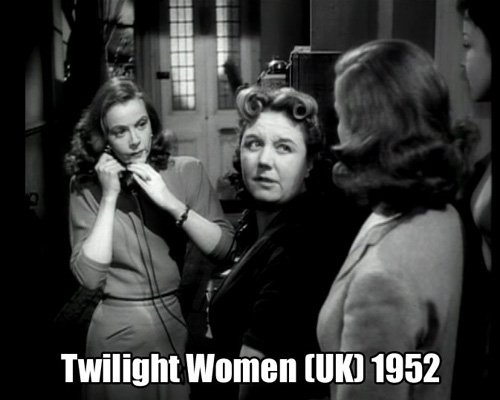 |
Twilight Women (UK) 1952 Also known as “Twilight of Women,” this is an unpretentious, unpolished gem about unwed mothers and situations available to them. The Brits are at their best when they make films for themselves – this film didn't have a prayer of getting a seal from the Hays office – and while the ending seems upbeat for at least one character until, of course, you give a mild think to it. The story opens with Chris Ralston (Lois Maxwell) – the girlfriend of lounge singer Jerry Nolan (Laurence Harvey) -- finding out that she's pregnant and that Jerry is a killer. He's arrested and she's out on the street and on her own and the only place – due to her notoriety – is an expensive boarding house run by Mrs. Helen ‘Nelly’ Alistair (Freda Jackson). In truth, Alistair is running a baby farm and there's a child buried in the backyard. Hollywood would have turned it into a horror story or something like "Leave Her to Heaven." The Brits take a different tack and play it as an ensemble and there's every indication that this could have become a “message” movie instead of a tight drama about working class women. Directed by Gordon Parry, it also stars René Ray, Vida Hope, Joan Dowling, Dorothy Gordon and Mary Germaine, among others. |
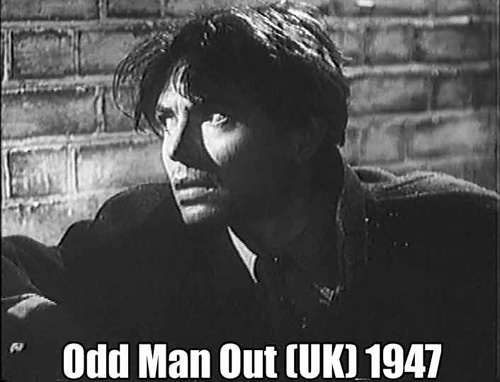 |
Odd Man Out (UK) 1947 Carol Reed’s “other” film and one that may be just as good as “The Third Man.” The story is of a rebel political leader – and the film begins with a disclaimer that it supports neither side and the term Irish Republican Army is never used – who after being in hiding for years insists on taking part in an armed robbery where he kills a man and is himself severely wounded. What usually gets reduced to a morality-based procedural with the forces of good in pursuit of the evil dangers of the underworld instead becomes a story of a wanted man trying to escape amid an occupied population that doesn’t necessarily endorse what the wanted man did and at the same time is loath to turn him in to the authorities. In a conversation with a priest – who is clearly taking sides – the police inspector notes, “In my profession there is neither good nor bad. There is innocence and guilt. That's all.” That sensibility – that is actually subverted by the content of the film – is a far cry from how Hollywood would treat similar material and is what makes this film so compelling. That and an incredible performance by James Mason, who relies on playing the character with nuance in a script that doesn’t rely on speeches or overwrought confrontations to make its points, and an excellent supporting cast whose character’s motives vary and sometimes aren’t clear. The film always seems headed toward the usual resolution of repentance and redemption and that the lovers will somehow find the rainbow at the end of their troubles and Reed leads the viewer down the garden path with all of those elements in play until the film ends in the only way it really can. There are no contrived mysteries here, no distracting cameo appearances, or faux naïveté begging for an explanation of how the world really works. Just a down and dirty story told in a down and dirty way. Directed by Carol Reed. Written by FL Green and RC Sherriff based on a novel by FL Green. Cinematography by Robert Krasker. Music by William Alwyn. Starring James Mason, Robert Newton, Cyril Cusack, FJ McCormick, William Hartnell, Fay Compton, Denis O'Dea, WG Fay, and Maureen Delaney, among others. |
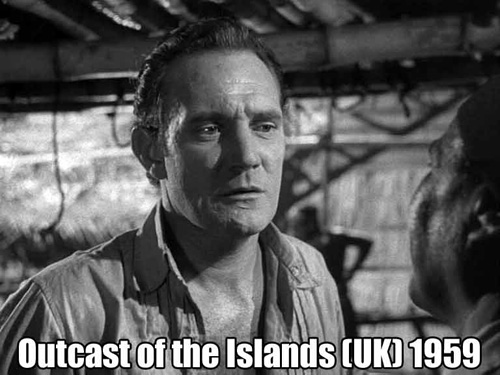 |
Outcast of the Islands (UK) 1959 Another winner from director Carol Reed and it forces the question as to why this film and “Odd Man Out” aren’t more readily available on DVD. Starring Ralph Richardson, Trevor Howard, Robert Morley, Wendy Hiller, and Kerima, in the major roles, the story – based on a Joseph Conrad and adapted by William Fairchild – concerns a man slowly and then suddenly becoming undone by resentment, greed – and for want of a better word – lust. Shot on location in Sri Lanka (as well as a studio in England), the tale is of a man of questionable repute who arrives at an island in the south seas and wheedles his way into the good graces of a successful trader who has a secret place to trade with the indigenous people in an area that is located in waters that are dangerous to navigate. Between knowing the secret and the desire for the chief’s brave and beautiful daughter, loyalties and secrets become just another form of commerce. Many have said that this film is the best adaptation of a Joseph Conrad novel. Not having read the book, I can’t say. It is, however, a damn good film. |
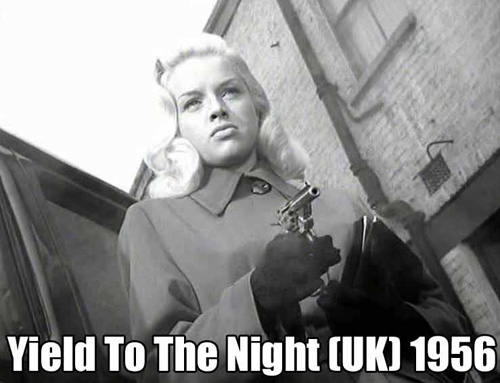 |
Yield To The Night (UK) 1956 Truth be told, I’ve never really been impressed by Diana Dors and almost passed on seeing this because of that. Don’t make the same mistake. This film was made in what I consider to be the golden age of Brit flicks and once again they produce a subset of a crime genre in a way that Hollywood never could. Boiled down to its moving parts, it’s a lover’s revenge story with a twist and that twist is that one woman guns down the other in a nicely shot opening scene. How that came to happen is told in flashbacks between the mundane and monotonous days in prison waiting to hear if she will be reprieved from the gallows. Rather odd closing sequence caps off a nice piece of work. Thanks to Kathy Henderson for the tip. Directed by J. Lee Thompson. With Yvonne Mitchell, Michael Craig, Marie Ney, and Olga Lindo, among others. Cinematography by Gilbert Taylor with music by Ray Martin. |
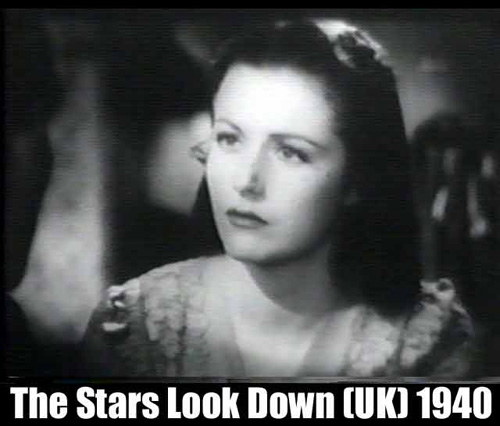 |
The Stars Look Down (UK) 1940 Directed by Carol Reed and based on the novel by AJ Cronin (who co-wrote the screenplay), the film takes place in a coalmining community in Northeast England in the mid-1930s. The mining company wants to expand the mine to an area that the miners believe is unsafe and they strike in defiance of the miners’ union. Things don’t go well for them or for the educated son of a miner who is trying to get better conditions in the pits. For authenticity, the costumer bought clothes from the real miners, or so the story goes, and the set of the mine used at the end was the biggest set built in England for a movie at that time. Good, solid – if a bit conventional – filmmaking. In 1941, New York Times noted: “But now and again there comes along a film that seems to have been struck off at white heat, that surges with indignation, that says what it has to say with complete and undeviating honesty.” With Michael Redgrave, Margaret Lockwood, Emlyn Williams, Nancy Price, and Allan Jeayes, among others. Cinematography by Mutz Greenbaum and Ernest Palmer. Music by Hans May. |